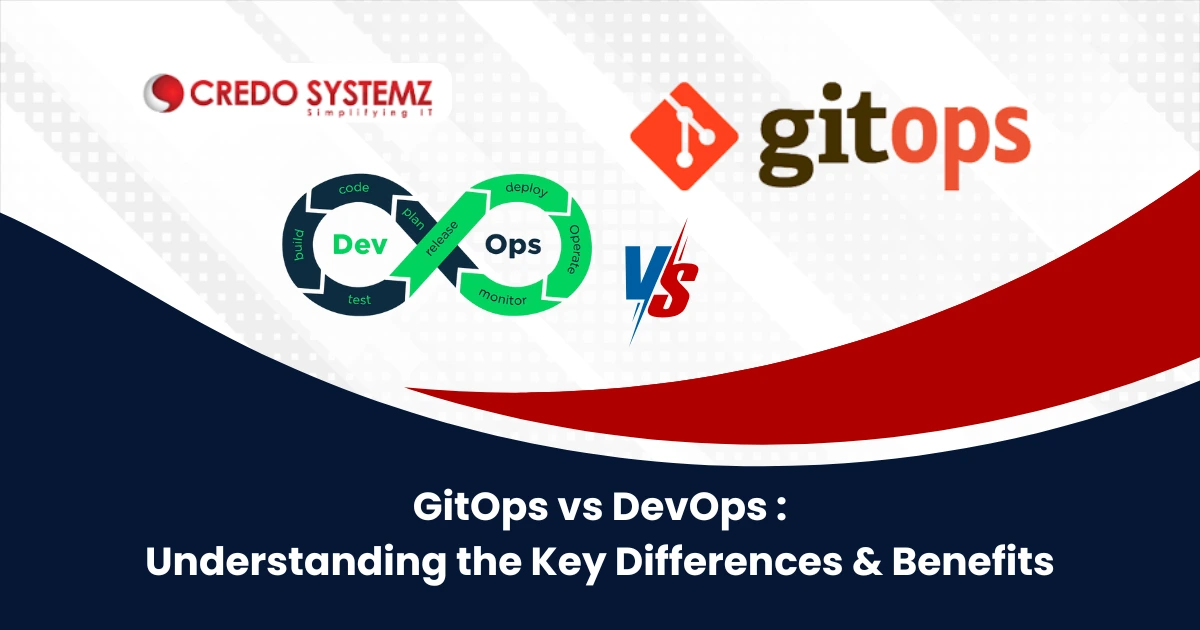
Introduction
In the software development and operations field, DevOps and GitOps are the highly adopted essential methodologies that improve efficiency, automation, collaboration, and faster deployments. These approaches share common principles but distinct purposes and different implementation strategies. Let’s explore the key differences between GitOps and DevOps, their benefits, and implementation.
DevOps
DevOps is the globally adopted software development and IT operations methodology that accelerates software development and deployment. It bridges the gap between development (Dev) and operations (Ops) teams. DevOps is a set of practices and cultural philosophies that emphasize collaboration, automation, and continuous integration and delivery (CI/CD).
Key Principles of DevOps
- Collaboration & Communication
- Continuous Integration & Continuous Deployment (CI/CD)
- Automation
- Monitoring & Feedback
- Infrastructure as Code (IaC)
DevOps achieves collaboration and communication by offering a shared responsibility model between developers and IT operations. It automates code integration, testing, and deployment. DevOps reduces manual effort through tools like:
- Jenkins
- Ansible
- Terraform
- Kubernetes
To perform effective monitoring, DevOps uses observability tools like Prometheus, Grafana, and Dynatrace for continuous improvement.
Benefits of DevOps
- Faster software releases
- Improved collaboration and communication
- Enhanced reliability and stability
- Automated deployment with reduced manual errors
- Continuous feedback for better performance
GitOps
GitOps is a subset of DevOps that extends the concept of Infrastructure as Code. It focuses on managing and automating infrastructure and application deployments using Git. GitOps ensures all changes to infrastructure are version-controlled and automatically applied via Git repositories.
Key Principles of GitOps
- Declarative Infrastructure: Defines infrastructure and application configurations in a version-controlled Git repository.
- Git as the Single Source of Truth: Git repositories store the desired state of applications and infrastructure.
- Automated Deployments: Any changes in Git automatically trigger deployments using tools like ArgoCD and Flux.
- Auditability & Security: Every change is tracked in Git, ensuring better auditability and security.
Benefits of GitOps
- Full traceability
- Automated and consistent deployments
- Improved security
- Easier rollback with Git history
- Enhanced collaboration through Git workflows
Key Differences Between GitOps and DevOps
- DevOps is a cultural and technical practice that integrates development and operations, whereas GitOps is a methodology for managing infrastructure and application deployments.
- DevOps focuses on software development, deployment, and operations, while GitOps focuses on infrastructure and application deployment.
- Automation tools in DevOps: Jenkins, Terraform, Ansible, Kubernetes.
- Automation tools in GitOps: ArgoCD, Flux, Kustomize, Helm.
- DevOps uses various tools for CI/CD, monitoring, and management, but in GitOps, Git acts as the single source of truth.
- Infrastructure as Code (IaC) is a core principle of GitOps, whereas in DevOps, IaC is only a part of the practice.
When to Use DevOps vs GitOps?
- DevOps is suitable for software development and deployment methodology.
- GitOps can be used for infrastructure and application deployments.
- Both DevOps and GitOps can manage cloud-native applications.
- DevOps enables continuous monitoring and logging, while GitOps provides automated rollbacks and version-controlled deployment.
Conclusion
To conclude, DevOps and GitOps are necessary practices for improved traceability, automation, and rollback capabilities. Global organizations are widely adopting GitOps within their DevOps culture. Choosing between DevOps and GitOps depends on the infrastructure, application architecture, and deployment requirements.
To master DevOps and GitOps skills, Credo Systemz provides DevOps courses and GitOps training in Chennai. With a hybrid approach, most companies combine both to gain the best results for modern cloud-native applications.
Join Credo Systemz Software Courses in Chennai at Credo Systemz OMR, Credo Systemz Velachery to kick-start or uplift your career path.
